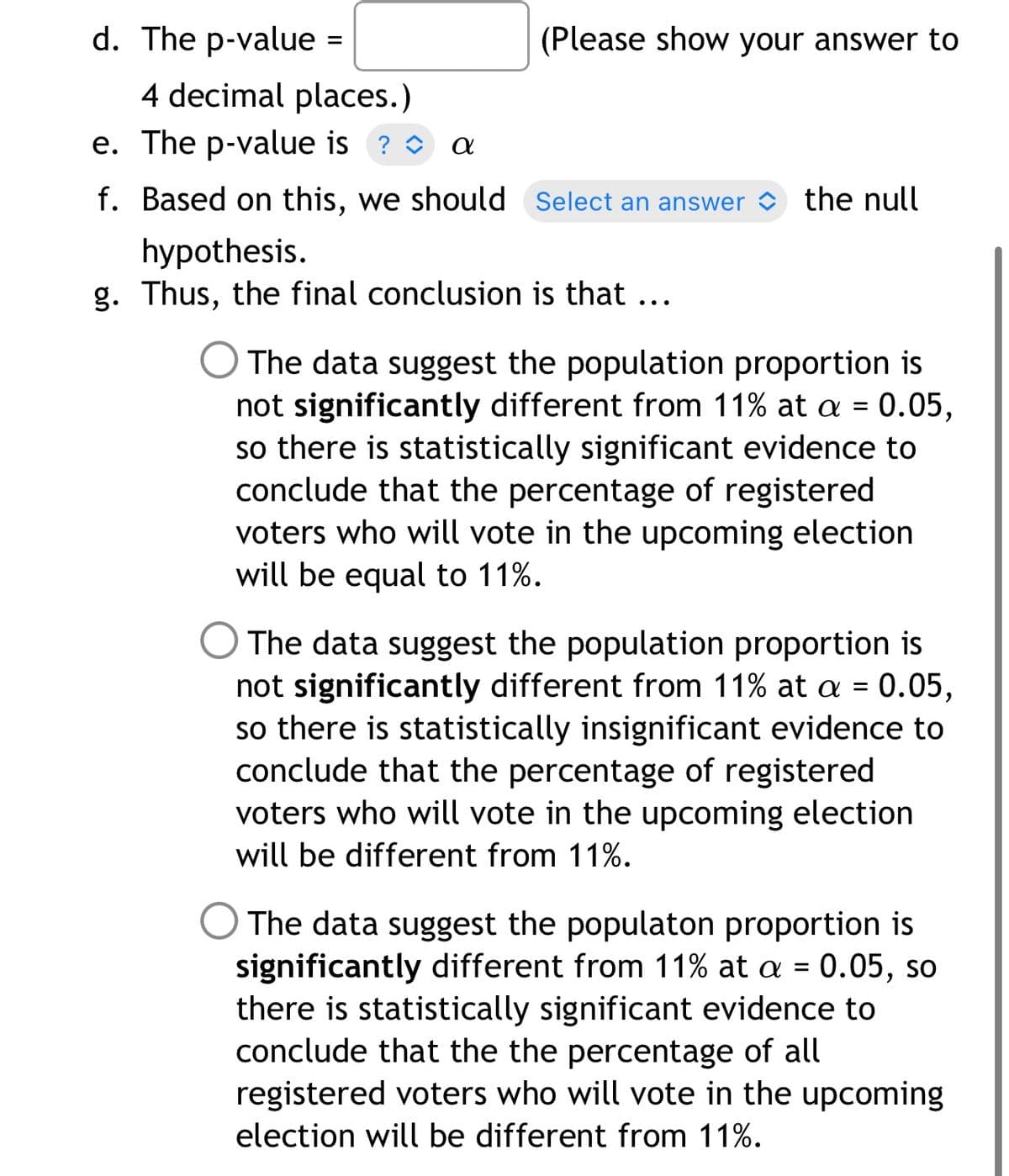Only 11% of registered voters voted in the last election. Will voter participation change for the upcoming election? Of the 379 randomly selected registered voters surveyed, 34 of them will vote in the upcoming election. What can be concluded at the a = 0.05 level of significance?
Only 11% of registered voters voted in the last election. Will voter participation change for the upcoming election? Of the 379 randomly selected registered voters surveyed, 34 of them will vote in the upcoming election. What can be concluded at the a = 0.05 level of significance?
Holt Mcdougal Larson Pre-algebra: Student Edition 2012
1st Edition
ISBN:9780547587776
Author:HOLT MCDOUGAL
Publisher:HOLT MCDOUGAL
Chapter11: Data Analysis And Probability
Section11.4: Collecting Data
Problem 6E
Related questions
Question

Transcribed Image Text:Only 11% of registered voters voted in the last election. Will
voter participation change for the upcoming election? Of the
379 randomly selected registered voters surveyed, 34 of
them will vote in the upcoming election. What can be
concluded at the a = 0.05 level of significance?

Transcribed Image Text:d. The p-value =
(Please show your answer to
4 decimal places.)
e. The p-value is ? o a
f. Based on this, we should Select an answer
the null
hypothesis.
g. Thus, the final conclusion is that ...
O The data suggest the population proportion is
not significantly different from 11% at a = 0.05,
so there is statistically significant evidence to
conclude that the percentage of registered
voters who will vote in the upcoming election
will be equal to 11%.
The data suggest the population proportion is
not significantly different from 11% at a = 0.05,
so there is statistically insignificant evidence to
conclude that the percentage of registered
voters who will vote in the upcoming election
will be different from 11%.
The data suggest the populaton proportion is
significantly different from 11% at a = 0.05, so
there is statistically significant evidence to
conclude that the the percentage of all
registered voters who will vote in the upcoming
election will be different from 11%.
Expert Solution
This question has been solved!
Explore an expertly crafted, step-by-step solution for a thorough understanding of key concepts.
This is a popular solution!
Trending now
This is a popular solution!
Step by step
Solved in 3 steps

Recommended textbooks for you

Holt Mcdougal Larson Pre-algebra: Student Edition…
Algebra
ISBN:
9780547587776
Author:
HOLT MCDOUGAL
Publisher:
HOLT MCDOUGAL

Glencoe Algebra 1, Student Edition, 9780079039897…
Algebra
ISBN:
9780079039897
Author:
Carter
Publisher:
McGraw Hill

College Algebra (MindTap Course List)
Algebra
ISBN:
9781305652231
Author:
R. David Gustafson, Jeff Hughes
Publisher:
Cengage Learning

Holt Mcdougal Larson Pre-algebra: Student Edition…
Algebra
ISBN:
9780547587776
Author:
HOLT MCDOUGAL
Publisher:
HOLT MCDOUGAL

Glencoe Algebra 1, Student Edition, 9780079039897…
Algebra
ISBN:
9780079039897
Author:
Carter
Publisher:
McGraw Hill

College Algebra (MindTap Course List)
Algebra
ISBN:
9781305652231
Author:
R. David Gustafson, Jeff Hughes
Publisher:
Cengage Learning